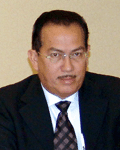Q & A with Edison Briesen, Aruba’s Tourism and Transportation Minister


by Jose Carlos de Santiago
CHA Caribbean Marketplace 2008 - Bahamas
Aruba wrapped up 2007 with good-looking numbers on the board as far as tourism is concerned and prospects for the now-unfolding 2008 can’t look any better. As Aruba is willing to split the outbound travel markets on wiser shares in an effort to cut down on the heavy reliance it has on the U.S., more Spanish hotel companies are planning to open properties on the island. In this exclusive interview with Caribbean News Digital, tourism Minister Edison Briesen talks about his country’s projects on the road ahead.
Q.- How do you assess the results of Aruba’s travel industry in 2007 and what plans are now in store for 2007?
A.- 2007 witnessed a number of major changes for Aruba’s tourism, like the transformation of the Oranjestad seaport to accommodate cruise liners and the debut of Spanish hotel company Sol Meliá. We now have the cruise terminal in the crosshairs and that’s one of the things we’ll have to make a decision on quite soon in order to go ahead with all necessary changes that must be done at the Oranjestad port.
Another major project is the one led by the Divi Group. We now have a corridor somewhere between Eagle Beach and Palm Beach, yet we’re planning to open a second corridor not far from there. The Divi Group made an excellent presentation back in December and they’re ready to start the groundbreaking job as soon as we authorize them to do so, based on a number of conditions they laid out, such as the local government’s commitment to contributing part of the project’s infrastructure, more specifically a brand-new golf course and three hotels for a grand total of 1,200 guestrooms.
These are two largest projects we’re working on right now. However, we’re a bit concerned about all this due to the amount of new rooms which will be opening in Aruba. There are 2,000 new condo rooms under construction, and if we add the new expansions and the new projects, we’ll be sooner rather than later jumping from 7,200 rooms to as many as 13,000 or 14,000 accommodations on the island. Aruba has never been a massive travel destination, but a high-end, top-quality one.
Q.- How is Aruba’s Tourism Ministry going to tackle the new openings coming from European markets?
A.- Once all ongoing projects are done –including the Grand Occidental, RIU and Meliá projects- Spanish hotel companies will have as much as 14 percent of all guestrooms in Aruba. The Pullmantur cruise operation, on the other hand, is generating large tourist arrivals with the Boeing 747 aircraft that takes off in Madrid and lands in Aruba every Saturday, not to mention the Aida Tours cruises with four charter flights from Germany and a couple of other charter flights from UK. That adds up to a total of seven charter flights from Europe that arrive in Aruba every two weeks. In addition to all that, we can’t forget to mention our commitments with KLM.
I believe we’re doing well because the openings of new hotels from Spain-based companies in Aruba is giving us the possibility of reeling in far more travelers from Europe, visitors who come to our island nation with a strong currency in their pockets and who book average stays in the neighborhood of 13 to 14 nights.
Q.- Spanish hotel groups rely on all-inclusive operations in an effort to provide a better service at a lower price. That differs from the way U.S. hotel companies conduct business on the island and elsewhere in the Caribbean. How do you think this difference might affect the U.S. market and the way Americans run lodgings in your country?
A.- I must say we still have a heavy reliance on the U.S. market, somewhere between 73 and 74 percent of all travelers. We’d like to slash it down to 50 or 55 percent and yet that’ll be the lion’s share of the total because we just can’t rule out how much that particular outbound market means to us in terms of magnitude and nearness. Nonetheless, we’d like to raise the share of European trekkers to 15 percent, and have an equal share of 15 percent from Latin American visitors. That’s the formula we want to work on. We continue to rely way too much on the U.S. market and that poses some threats. That explains how important it is to us to have European and Latin American investors coming to Aruba. A better, evener proportion of the market pie among those three markets is the right thing to do and we’re working hard on that.
Q.- Is there any real possibility for Aruba to launch a true promotional effort in Europe before the coming elections on the island?
A.- We are well aware of the need to press that issue, but promotions take airlift, plane seats and with that view in mind we ought to sit down with KLM and try to negotiate openings with other airlines as well. As I said earlier in this interview, as much as 14 percent of Aruba’s hotel rooms will soon be in Spanish hands, so that means that we need to hold talks with Iberia, press this issue with Spanish groups to open a Madrid-Aruba route, not only for the Spanish market but also for the Portuguese and Italian markets as well.














